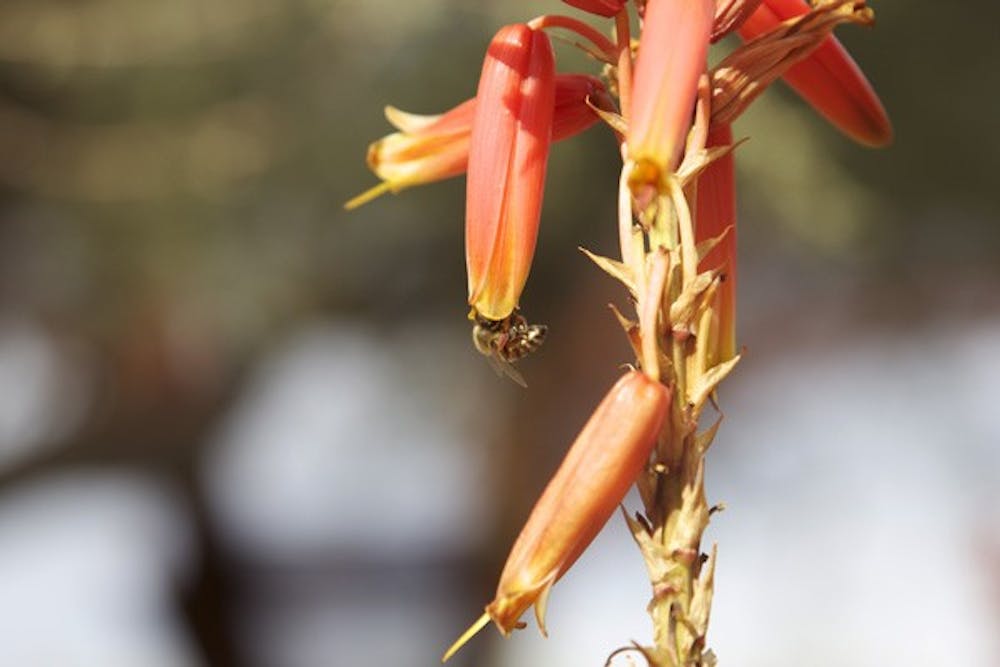 Spring brings warm weather, blooming flowers and bees. So far ASU has sent out 12 e mails advising students to avoid areas around campus due to bees. (Photo by Ana Ramirez)
Spring brings warm weather, blooming flowers and bees. So far ASU has sent out 12 e mails advising students to avoid areas around campus due to bees. (Photo by Ana Ramirez)The increase in bee swarms around University campuses has prompted 12 email advisories from the ASU Alerts and Advisory System within the last month.
However, bee experts at ASU said the increase in bee swarms is a natural springtime occurrence.
Mike Schantel, ASU Grounds Services supervisor, said it seems that there is a large number of bee advisories, because this is the first year ASU implemented its advisory system. This isn’t meant to panic students but to inform them about the bees, so the grounds crew can deal with them.
“It may seem like there is a lot, but this is just a new tool for the University,” Schantel said. “The advisories are put out just to let students know (the bees) are there.”
When Grounds Services receives a call about bees on campus, it first determines whether the bees belong to a swarm or a hive. A swarm of bees is a colony transitioning between hives and is typically more docile, but a hive is a permanent shelter that the bees defend.
If the department encounters a hive, they may destroy it to remove the bees from campus, Schantel said.
Students shouldn't be concerned, because the bees mentioned in the email advisories were in swarms, he said.
“A lot of people mistake a swarm for a hive,” Schantel said.
Students shouldn’t be afraid of encountering the Africanized bees that are often discussed the news in Arizona, he said.
Africanized bees or “killer bees,” which arrived in Arizona in 1993, are typically more aggressive than average honeybees and are known to target household pets and children, according to the U.S. Agricultural Research Service.
“There is a lot of concern for Africanized bees, but in reality, they are mostly just honeybees,” Schantel said.
Students place 60 to 80 calls about bees to ASU Facilities Development and Management each spring, and regardless of their role in pollination, bees still sting, Schantel said.
ASU School of Life Sciences professor Julie Mustard, whose research is focused on learning and memory in bees, said bee colonies flourish and look for more places to build their hives in the spring.
“During springtime, bee colonies increase in size, and they raise more queens,” Mustard said.
The colonies split up as the bees going out with the queen to look for a place to live, she said.
Mustard, who co-authored a study about the effects of caffeine on bees' memory, said the bees are likely harmless to students during this period of swarming, because there is no hive for them to actively defend.
“As long as people don’t mess with them, they’re pretty much calm,” Mustard said. “They just want to do their job.”
Mustard said the bees are very important to the local environment because of the role they play in pollinating flowers and other plants. She said the insect is often misunderstood and should be respected.
“They are doing us a big favor,” Mustard said. “Seventy percent of the food we eat is pollinated by insects.”
University spokeswoman Julie Newberg said the advisories and caution tape surrounding the bees are used to tell people to avoid the area, but the bees are typically harmless.
“Swarms are typically gentle and not interested in harming people,” Newberg said. “They will usually be left alone as the bees typically move on. If bees are aggressive in an active hive and pose a danger, it may be necessary to eradicate the bees from campus.”
Reach the reporter at jwthrall@asu.edu or follow him @Jthrall1




